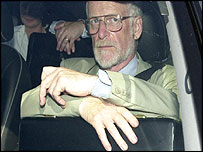
David Kelly's death prompted the Hutton Inquiry.
|
Foreign Secretary David Miliband has published an early draft of the UK's infamous dossier on Saddam Hussein's weapons of mass destruction.
The document, by Foreign Office press chief John Williams, was an unpublished draft of the September 2002 dossier.
The Conservatives and Lib Dems say its similarities to the final version show "spin doctors" had played a crucial role in drawing up the dossier.
The government says it was never part of the formal drafting process.
The Foreign Office lost its appeal against a ruling the document be published under the Freedom of Information Act.
It had argued that publishing it could inhibit the "effective conduct of government".
'Sexed up' claim
Officials say Mr Williams's draft dossier was quickly set aside after it was decided to give responsibility for the document to the then chairman of the Joint Intelligence Committee (JIC), John Scarlett.
Mr Miliband said it was not used as the basis for the dossier which the government eventually published - which was at the heart of a row between the government and BBC over claims it was "sexed up".
Mr Williams's draft does not include the famous "45 minute claim" - that Saddam Hussein had weapons of mass destruction which could be used within 45 minutes of him giving an order.
But Edward Davey for the Lib Dems said the "core analysis" was the same as the final published version, adding: "A press official should never have been drafting a document that ended up being used as the justification for going to war."
And shadow foreign secretary William Hague added: "This is yet further evidence that spin doctors, not intelligence analysts, were leading from the first in deciding what the British people were told about Iraq's weapons of mass destruction."
Inquiry call
He said it highlighted the need for a full Privy Council inquiry into the origins and conduct of the Iraq war.
But Mr Miliband said Mr Williams's paper "was not commissioned as part of the formal drafting process and was not used as the basis for the dossier which the government subsequently published".
The paper, dated 24 July 2002, was drawn up after then prime minister Tony Blair suggested the publication of a dossier setting out the threat posed by Iraq.
 |
PUBLISHED REVISIONS (2002)
Most computers will open this document automatically, but you may need Adobe Reader
|
The official September 2002 dossier was the subject of a BBC report which suggested it had been "sexed up" shortly before publication.
Weapons expert Dr David Kelly was found dead shortly after being named as the source of the BBC report.
Dr Kelly cited the example of the claim that Saddam Hussein had weapons of mass destruction which could be used within 45 minutes of him giving an order.
Following an inquiry into the "circumstances surrounding the death" of Dr Kelly, Lord Hutton concluded he had taken his own life and criticised the BBC.
He said the 45 minute claim had not been inserted into the dossier by Downing Street against the wishes of intelligence chiefs, stressing that JIC head John Scarlett had had "ownership" of the dossier.
The Freedom of Information request for Mr Williams' draft, which was mentioned in passing during the Hutton inquiry, was made by researcher Christopher Ames.
The Foreign Office (FCO) had refused to hand over the document, saying that its publication would "inhibit the free and frank provision of advice and the free and frank exchange of views for the purposes of deliberation".
But its appeal against that decision was rejected by the Information Tribunal, which said: "Information has been placed before us, which was not before Lord Hutton, which may lead to questions as to whether the Williams' draft in fact played a greater part in influencing the drafting of the dossier than has previously been supposed."
The tribunal also revealed that the draft was "annotated in two different persons' handwriting, suggesting that at least one person other than the author had reviewed and commented on it".
However, the tribunal has ordered that one of the handwritten notes should be taken off the draft when it is released.



Bookmark with:
What are these?